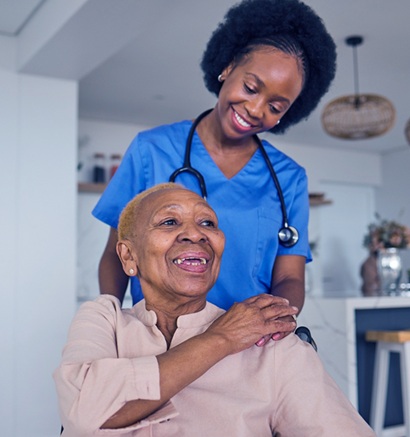Home Safety Checklist for Dementia Care In Nigeria
Welcome to our blog dedicated to elderly care in Nigeria. As the population ages, the importance of providing quality care and ensuring the safety and well-being of our elderly loved ones becomes increasingly vital. In Nigeria, like many other countries, families are responsible for caring for ageing relatives while navigating unique cultural, economic, and social challenges.
In this blog, we aim to address various aspects of elderly care in Nigeria, offering insights, resources, and practical tips to support caregivers and families in providing the best possible care for their elderly loved ones. From home safety to health care access and cultural considerations, our goal is to empower caregivers with the knowledge and tools they need to ensure the comfort, dignity, and safety of Nigeria's elderly population.
Dementia and Alzheimer’s:
· Dementia encompasses a range of cognitive impairments affecting memory,
thinking, and behaviour.
· Alzheimer’s disease is the most common form of dementia,
characterised by progressive memory loss and cognitive decline (Alzheimer’s Society).
Home Safety Checklist:
A dementia home safety checklist is crucial in ensuring the well-being and security of individuals living with Alzheimer's disease or other forms of dementia. as the disease progresses, these individuals may become unaware of potential dangers in their environment.
The checklist aims to minimise risks, prevent accidents and maximise independence for as long as possible.
1. Floor Safety:
- Ensure that floors are free from clutter and obstacles.
2. Lighting:
- Night lights should be used in bedrooms, bathrooms, and other areas during nighttime.
3. Bathroom Safety:
- Use non-slip mats or adhesive strips in the bathtub or shower to prevent slipping.
- Ensure that the water heater is set to a safe temperature to prevent scalding.
4. Kitchen Safety:
- Install safety knobs on the stove to prevent accidental burns or fires.
- Use non-slip rugs or mats in front of the sink and stove.
5. Bedroom Safety:
- Install bedside lamps or night lights for easy access during the night.
- Keep pathways clear to prevent tripping hazards.
6. Emergency Preparedness:
- Have a plan for emergencies, including fire drills and evacuation procedures.
7. Medication Management:
- Keep medications organised and properly labelled to prevent errors.
8. General Safety:
- Keep walkways and outdoor areas well-lit and clear of obstacles.
- Ensure that locks on doors and windows function properly to prevent unauthorised entry.
Implementing this home safety checklist can help caregivers create a safe and comfortable environment for elderly loved ones in Nigeria, promoting their independence, well-being, and quality of life. Stay tuned for more tips and insights on elderly care in Nigeria in our upcoming blog posts.
A comprehensive list is contained in the eBook.
Book Launch
We are thrilled to announce the upcoming launch of our latest book:
"Elderly Care in Nigeria: An Essential Guide
to Navigating Services."
Ageing is a universal phenomenon, and Nigeria, like many other
countries, is experiencing a demographic shift towards an ageing population.
According to the World Health Organisation (WHO), the number of people aged 60
years and older in Nigeria is projected to triple by 2050. With this
demographic transition comes a pressing need to address the health and
well-being of older adults in the country.
This comprehensive guide delves into the intricacies of caring for the elderly in Nigeria, offering invaluable insights, resources, and advice to caregivers and families. Whether seeking information on healthcare services, legal matters, or emotional support, this book is your ultimate companion. Be the first to receive notification upon its release by signing up through our website. Don't miss the opportunity to gain vital knowledge and support for elderly care in Nigeria. Join us in making a difference in the lives of our seniors.
Email info@eooncare.com and
request your copy.
EOON CARE
Elderly Care Team
info@eooncare.com
WhatsApp +234 816 7929 521
#elderlycareinnigeria #elderlycare
#caregivers #careoftheelderlyinnigeria
#ministeryofhealth #elderlyabuse
#who #unitednations
#socialservicesinnigeria
#carehomesinnigeria
#nigeriacarehomes





No comments:
Post a Comment